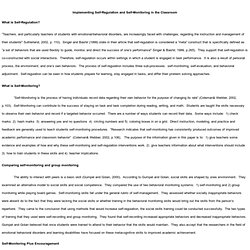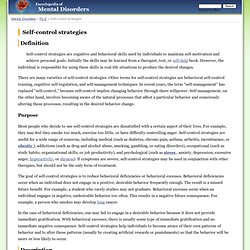

Preventing false memories. Www.center-trt.org/downloads/wisewoman/strategies/Self-Monitoring.pdf. Self Regulation. Implementing Self-Regulation and Self-Monitoring in the Classroom What is Self-Regulation?

“Teachers, and particularly teachers of students with emotional/behavioral disorders, are increasingly faced with challenges, regarding the instruction and management of their students" Sutherland, 2002, p. 110). Singer and Bashir (1999) state in their article that self-regulation is considered a “meta” construct that is specifically defined as “a set of behaviors that are used flexibly to guide, monitor, and direct the success of one’s performance" Singer & Bashir, 1999, p.265).
They support that self-regulation is co-constructed with social interactions. Therefore, self-regulation occurs within settings in which a student is engaged in task performance. What is Self-Monitoring? “Self-Monitoring is the process of having individuals record data regarding their own behavior for the purpose of changing its rate” (Coleman& Webber, 2002, p.103). Comparing self-monitoring and group monitoring References. Self-Monitoring, Human Nature, and Sustained Learning « Professional Sport Psychology Symposium.
It is a psychological reality that self monitoring enhances learning and ultimately enhances performance on the playing field.

This process of performance improvement is grounded by well set goals and continued through periodic thoughtful reflections. “Thoughtful reflection” can take many forms. It ranges from Curt Shilling’s in depth journaling during and after games throughout his career to regular meetings with sport psychology consultants to debrief and reflect on practices and performances. Considering all this, one must consider the philosophical “human nature” factor in the embracing of self-monitoring. Young and his colleagues recently examined the use of training logs on athlete beliefs and performance (Young et al. (2009). In this study, benefits appeared to taper off after about 17 days. Here are a few ideas to] maximize the potential of self-monitoring and make it stick: 1. 2. 3. Quality self-assessment leads to athletes that learn quickly and perform at their potential.
Www.teamunify.com/njnjwst/__doc__/Athlete Training Log.pdf. Self-control strategies - children, causes, therapy, drug, examples, person, people, used. Photo by: vision images Definition Self-control strategies are cognitive and behavioral skills used by individuals to maintain self-motivation and achieve personal goals.

Initially the skills may be learned from a therapist, text, or self-help book. However, the individual is responsible for using these skills in real-life situations to produce the desired changes. There are many varieties of self-control strategies. Purpose Most people who decide to use self-control strategies are dissatisfied with a certain aspect of their lives. The goal of self-control strategies is to reduce behavioral deficiencies or behavioral excesses. In the case of behavioral deficiencies, one may fail to engage in a desirable behavior because it does not provide immediate gratification. Description Theoretical bases for self-control strategies Self-control strategies are based primarily on the social cognitive theory of Albert Bandura. Development of a self-control program Making a commitment. Aftercare Risks. Www.dtic.mil/dtic/tr/fulltext/u2/a446188.pdf.
Www.celea.org.cn/teic/61/61-3.pdf.